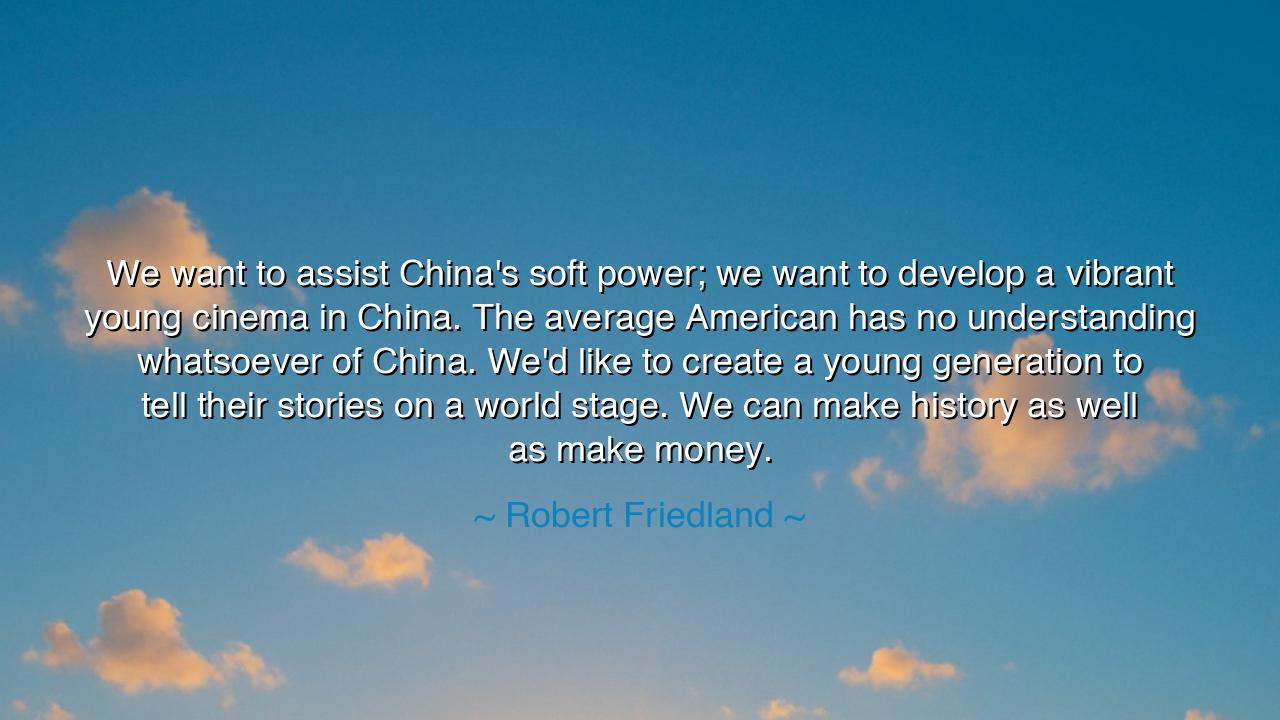
We want to assist China's soft power; we want to develop a
We want to assist China's soft power; we want to develop a vibrant young cinema in China. The average American has no understanding whatsoever of China. We'd like to create a young generation to tell their stories on a world stage. We can make history as well as make money.






In the voice of vision and ambition, the entrepreneur and cultural pioneer Robert Friedland once proclaimed: “We want to assist China’s soft power; we want to develop a vibrant young cinema in China. The average American has no understanding whatsoever of China. We’d like to create a young generation to tell their stories on a world stage. We can make history as well as make money.” These words, though born in the context of business and art, ring with the cadence of a prophecy. For they speak not only of commerce and cinema, but of understanding, of connection, and of the enduring power of storytelling to shape the destiny of nations.
When Friedland speaks of “soft power,” he touches upon one of the most subtle and enduring forces in civilization. Empires have risen and fallen through the might of armies, but cultures endure through the allure of their ideas, their art, and their narratives. To strengthen a nation’s soft power is to give it the ability to inspire rather than conquer, to influence rather than impose. Friedland’s vision, then, is not of domination, but of dialogue — a bridge built of film and imagination, spanning the distance between East and West. In a time when misunderstanding divides peoples, he recognizes that cinema — that living mirror of humanity — can serve as both ambassador and teacher.
The origin of this quote lies in the early 21st century, when China was emerging not only as an economic giant but as a cultural force seeking to define its image on the global stage. Friedland, an American entrepreneur with a keen sense of history and opportunity, saw that the future of influence would not lie in weapons or wealth alone, but in the stories a people tell about themselves. In the age of the moving image, the camera became the new pen of civilization. Thus, he sought to invest not merely in industry, but in imagination, nurturing a new generation of Chinese filmmakers who could express the soul of their nation to the world — who could make both money and meaning, both art and history.
This vision recalls the wisdom of the ancients, who understood that culture is the truest form of conquest. When Alexander the Great carried Greek civilization across the world, it was not his soldiers who endured, but his philosophers, his artists, his thinkers. Likewise, the Romans, though masters of empire, were conquered in turn by the culture of the Greeks they once subdued. And in later centuries, the European Renaissance drew from the ancient East — from mathematics, poetry, and art carried along the Silk Road — to give birth to its brilliance. Thus, Friedland’s words echo through time: to create understanding is to create strength that no sword can destroy.
When he says, “The average American has no understanding whatsoever of China,” Friedland laments a wound born of ignorance — a gap between civilizations that see one another through the fog of stereotype. Yet he does not despair. Instead, he offers a remedy: art as communication. Through the moving image, he seeks to give voice to the young — to the poets and dreamers who can speak not in the language of governments, but in the universal language of emotion. “We’d like to create a young generation to tell their stories on a world stage,” he says — a declaration not of policy, but of faith in the transformative power of storytelling. For every great civilization must not only live its story but tell it, lest it be defined by others.
This idea — that one may “make history as well as make money” — contains the balance between the material and the eternal. Friedland recognizes that progress need not be soulless, that prosperity and purpose can coexist. The merchant and the philosopher, the filmmaker and the statesman, all may labor together when guided by a higher vision: to use wealth not merely for gain, but for the enrichment of the human spirit. It is the same principle that guided the Medici of Florence, whose patronage of artists like Leonardo da Vinci and Michelangelo turned commerce into culture, and profit into immortality.
So, O listener, take this lesson from Robert Friedland’s vision: that in every age, the true power lies not in force, but in understanding; not in wealth, but in wisdom. If you would build something lasting — in your life, in your nation, in your art — let it be founded on empathy and imagination. Seek to know the stories of others, and to tell your own with honesty and heart. For the world is not changed by those who shout loudest, but by those who speak most truly.
Thus, let us remember his teaching: that the cinema, the poem, the song, the story — these are the instruments by which civilizations converse and evolve. To make such art is to shape the consciousness of humanity itself. And when we, like Friedland, strive to make history while making prosperity, we fulfill the noblest duty of humankind — to create beauty that unites, truth that endures, and stories that light the path between nations.






AAdministratorAdministrator
Welcome, honored guests. Please leave a comment, we will respond soon